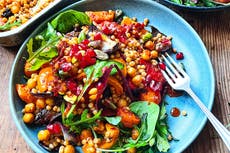Is it really better to drink your calories? The science behind soup and shake diets
In recent years, liquid-only diets have been touted both as a genuine weight loss technique and as a science-backed way of treating type 2 diabetes. Maria Lally finds out more


When we think of liquid or meal replacement diets, it’s easy to think of the likes of the lemonade diet (made popular by Beyoncé in the early 2000s, it involved consuming a mix of lemons, water, maple syrup and cayenne pepper for 10 days), and the cabbage soup diet. More recently, Huel, the plant-based meal replacement brand, has been valued at $560m (£439m).
But in recent years, liquid-only diets have also begun to establish themselves as a science-backed way of treating type 2 diabetes.
A study this week found that people can reverse their type 2 diabetes by consuming a 900-calorie-a-day diet consisting of shakes, soups and meal replacement bars for a short period of time.. The research, published in the journal Lancet Diabetes & Endocrinology journal, found that a third of patients lost two and half stones and put their diabetes into remission.
Emma Pike, deputy head of care at Diabetes UK, said the programme, available on the NHS, “gives people the support they need to lose weight and potentially put their type 2 diabetes in remission by providing low-calorie, total diet replacement products, such as soups and shakes for three months before a managed plan for reintroducing a healthy, balanced diet”.
In the UK, 4.4 million people live with diabetes; around 90 per cent of them have type 2 diabetes, which is largely caused by diet and lifestyle. Eight per cent have type 1 diabetes, which is an autoimmune condition often diagnosed in childhood and whose exact cause is unknown.
Meanwhile, it’s thought that an additional 1.2 million people could be living with type 2 and yet to be diagnosed. Unmanaged type 2 diabetes can damage organs, and lead to heart attacks and stroke, eye problems and even amputation of limbs.
“This study is enormously exciting,” says Professor Roy Taylor, professor of medicine and metabolism at Newcastle University and author of Your Simple Guide to Reversing Type 2 Diabetes.
“Type 2 diabetes was always something of a life sentence for its patients, who saw a diagnosis as very gloomy news. They were told they had a chronic disease that was going to get increasingly worse, and that they would be on insulin for years. There seemed no way out. So scientists had to unscramble what was causing it and find a way forward,” he said.
This latest study follows one last year led by Prof Taylor and Professor Mike Lean from Glasgow University that found patients who went on a low-calorie “soup and shakes” diet for three months went “into remission” from diabetes.

At the time, Prof Taylor said he avoided using the word “cure” because, “it has not gone away completely. This is remission, because if people put on the weight they have lost, the diabetes will come back.”
Type 2 diabetes aside, in 2018 researchers at Oxford University found obese adults who consumed around 800 calories a day, made up of weight-loss soups, shakes, bars and fibre supplements, lost over a stone more than regular dieters.
Prof Taylor, however, says it’s not that we lose more weight when we drink our calories. Rather that it can “abolish the day-to-day burden of decisions about how much – and of what – to eat. Liquid meal replacements also make it easier to take in a high-protein food with all necessary minerals and vitamins.”
So, what if you’re reading this and wondering whether you should try it too? “Meal replacement shakes, soups and bars should only be used by people who really need them,” says dietitian Helen Bond.

She goes on: “For example, those with type 2 diabetes; or who are obese or morbidly obese [BMI higher than 30 or 40 respectively]. They are not suitable for anyone under the age of 18, or who are pregnant and breastfeeding, or those who have struggled with disordered eating.”
Huel, which claims to be “nutritionally complete”, is slightly different, says Bond. It promises to be healthier and more convenient than a sandwich, and is made mostly of oats, flaxseed, and pea protein. “Weight loss isn’t the only goal with Huel, and I think it has a role to play in eating more healthily,” she says. “However, it was recently criticised as a UPF [ultra processed food], and while convenient I would argue it doesn’t have the social enjoyment of a normal meal.”
Juice cleanses or detoxes, meanwhile, are simply faddy and non-sustainable, says Bond. “They claim to help the body cleanse and detox, but our liver and kidneys are perfectly capable of doing that without any help.”
The bottom line? “People who try meal replacements often find it very hard to achieve adequate intake of essential nutrients, such as calcium and iron. Ultimately, a liquid diet is only recommended in a medical setting, and only if absolutely necessary.”
Join our commenting forum
Join thought-provoking conversations, follow other Independent readers and see their replies
Comments

Bookmark popover
Removed from bookmarks